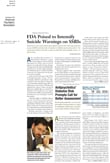APA, the American Academy of Child and Adolescent Psychiatry (AACAP), and more than 45 other medical specialty societies, as well as 50 state medical societies, have signed on to letters sent to every member of Congress in support of nondiscriminatory coverage for mental illness treatment.
The letters urge support for the Sen. Paul Wellstone Mental Health Equitable Treatment Act (S 486), introduced by Sens. Pete Domenici (R-N.M.) and Edward Kennedy (D-Mass.), and for a companion bill in the House (HR 953), introduced by Reps. Jim Ramstad (R-Minn.) and Patrick Kennedy (D-R.I.).
The bills would require group health plans that provide mental health benefits to do so without limits different from limits on medical and surgical benefits. If parity becomes law, health plans could not impose arbitrary durational limits on treatment or require patients to pay more out-of-pocket expenses for their mental health benefits. Businesses that employ 50 or fewer persons would be exempted.
Proof of Growing Collaboration
APA and AMA leaders say the support from the “House of Medicine” for nondiscriminatory coverage of mental illness is an extraordinary example of the growing collaboration between psychiatry and the rest of medicine.
“It’s a milestone and a very powerful statement,” said John McIntyre, M.D., chair of the psychiatry delegation to the AMA House of Delegates. “It shows that the issue of nondiscriminatory coverage has matured to the point where it is no longer only psychiatry’s issue, but is all of medicine’s issue.”
He added that beyond the political import of the letters, the support of so many state and specialty societies was a statement to patients that the medical community views mental illness as it does any other type of illness. “It’s a fundamental statement about how far we have come in our understanding of mental illness,” McIntyre told Psychiatric News.
McIntyre was echoed by Jeremy Lazarus, M.D., vice speaker of the AMA House of Delegates and chair of APA’s Council on Advocacy and Public Policy.
“The fact that we have been able to obtain such overwhelming support urging passage of the parity bill is another reminder of the strong collaboration we have with the rest of organized medicine,” Lazarus told Psychiatric News. “It also indicates the understanding and importance that our other medical colleagues place on the fair treatment of the mentally ill and how important appropriate and timely treatment is. The support that we have received should improve the chances that the legislation will pass.”
APA President Marcia Goin, M.D., also emphasized the landmark nature of the widespread support for nondiscriminatory coverage.
Speaking With One Voice
“The nation’s medical and mental health communities speak with one voice in fighting for fair and equitable employer-provided mental health insurance,” Goin said. “Our message to congressional leadership is clear: it’s time for a floor vote on this urgently needed legislation. Not only have majorities in both chambers signed on as cosponsors of mental health parity, but this legislation, by affording people the care they need, would save the nation’s economy billions of dollars in lost productivity. The time to act is now.”
The letters, sent to Senate Majority Leader Bill Frist (R-Tenn.) and Speaker of the House Dennis Hastert (R-Ill.), were the result of a resolution passed with unanimous support by the AMA House of Delegates in June 2003. That resolution was introduced by APA and AACAP.
The letter was signed by specialty groups as diverse as the American College of Surgeons, American College of Emergency Physicians, American Medical Directors Association, and American Society of Plastic Surgeons.
It was also signed by 49 state medical societies and the medical society of the District of Columbia. Only the Kansas Medical Society declined to sign on because of a stated position in opposition to insurance mandates, McIntyre explained.
Countering the Kansas position, McIntyre stressed that nondiscriminatory coverage is not an insurance “add on” in the form of state mandates, but a fundamental principle about the right to health care.
The letters to Frist and Hastert noted that 243 House cosponsors and more than 300 national organizations support nondiscriminatory coverage and that President Bush called on Congress in April 2002 to enact mental health parity legislation for him to sign.
Two House committees held hearings last year on the parity issue, but the House has yet to act, though more than half its members have cosponsored this year’s parity bill.
Michael Strazzella, deputy director for congressional relations in APA’s Division of Government Relations, told Psychiatric News that although opposition from the insurance industry and business community exists, there have been positive signs for the prospects of passage.
“APA is encouraged by the recent commitments from Senate Republican leaders to take up the Paul Wellstone Mental Health Equitable Treatment Act early this year,” Strazzella said. “It is imperative that all supporters of mental health parity continue their aggressive outreach to members of the House of Representatives.” ▪
